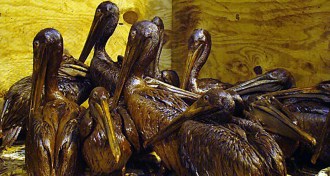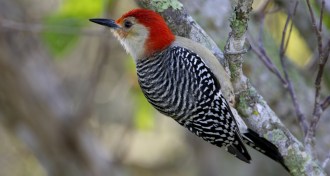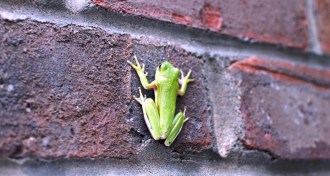All Stories
-
 Health & Medicine
Health & MedicinePoor ventilation in schools may spur TB spread
Researchers found high carbon dioxide levels in South African classrooms, suggesting that poor ventilation may contribute to tuberculosis transmission.
By Nathan Seppa -
 Environment
EnvironmentBP oil spill may have killed hundreds of thousands of birds
The 2010 Deepwater Horizon oil spill may have killed 600,000 to 800,000 coastal birds, new simulations suggest.
-
 Cosmology
CosmologyUniverse re-created in computer simulation
The Illustris Project traces the detailed evolution of the universe starting from 12 million years after the Big Bang.
-
 Genetics
GeneticsOrganism with artificial DNA alphabet makes its debut
Using DNA molecules other than A, C, G and T, scientists have created the first living organism with an expanded genetic alphabet.
By Beth Mole -
 Climate
ClimateCrop nutrients may drop as carbon dioxide rises
Many staple grains and legumes pack 5 to 10 percent less iron, zinc and protein when grown at carbon dioxide levels expected midcentury.
By Beth Mole -
 Psychology
PsychologyWhy every face you draw looks a little Neandertal
Just about everyone draws faces with the eyes too high and a low Neandertal forehead, maybe because of the way we perceive the shape of the head.
-
 Paleontology
PaleontologyDinosaurs could take tough breaks
Meat-eating dinosaurs may have survived some extremely bad bone breaks, according to detailed chemical maps of the fossils.
-
 Climate
ClimateFederal report details climate change in U.S.
The latest National Climate Assessment was released by federal officials May 6.
-
 Animals
AnimalsWoodpecker beaks divulge shock-absorbing properties
Scales, sutures and porosity help the birds hammer without going stupid.
By Susan Milius -
 Animals
AnimalsWhat animal is the world’s best rock climber?
Lots of animals manage to scale vertical heights, and each has their own way of accomplishing the feat.
-
 Math
MathThe Improbability Principle
The laws of mathematics and physics suffice to explain a world of coincidences, statistician David J. Hand argues.
-
 Anthropology
AnthropologyPeruvian glyphs pointed way to ancient celebrations
At least 2,300 years ago, Paracas people in the Chincha Valley of Peru were engineering their landscape to keep time and host ritual and social activities.